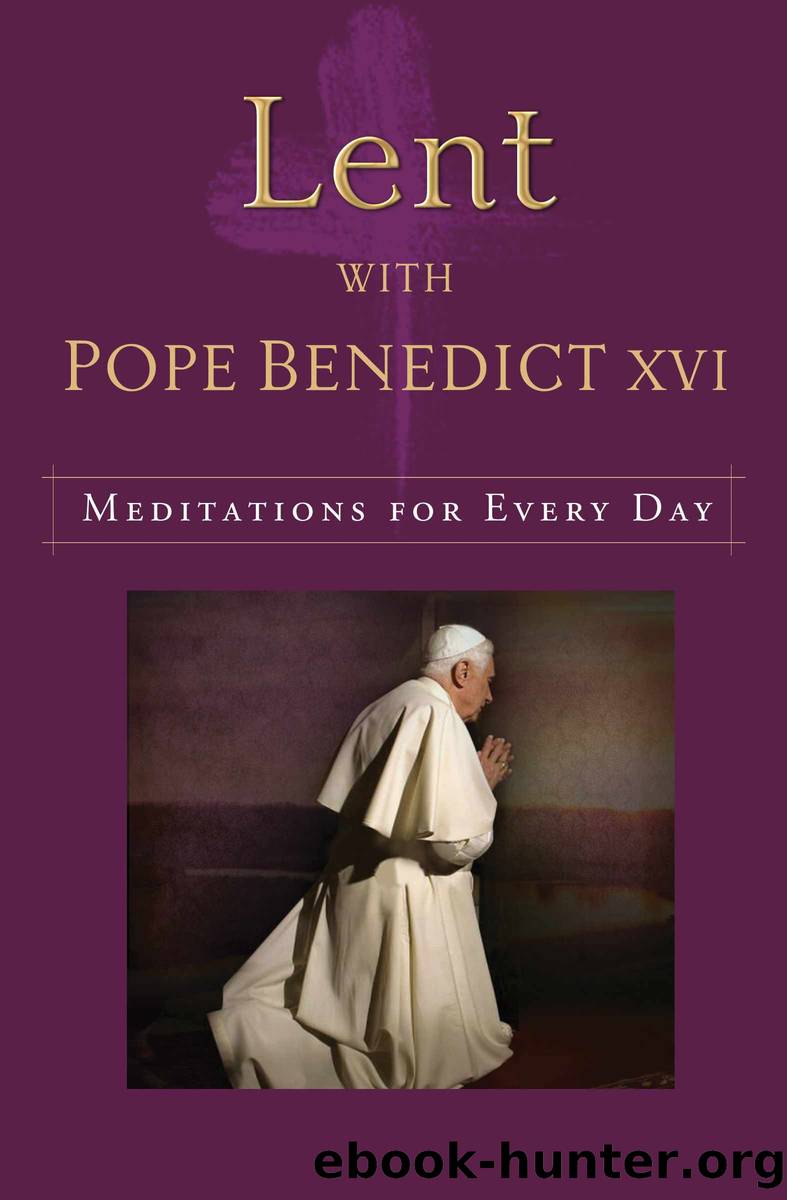Lent with Pope Benedict XVI: Meditations for Every Day by Benedict XVI Pope

Author:Benedict XVI, Pope
Language: eng
Format: epub
Publisher: The Word Among Us Press
Published: 2012-01-01T00:00:00+00:00
âAngelus Address, Fourth Sunday of Lent, April 3, 2011
Monday of the Fourth Week of Lent
THE MERCIFUL HEART OF THE FATHER
On this Fourth Sunday of Lent [Cycle C], the gospel of the father and the two sons, better known as the parable of the prodigal son (Luke 15:11-32), is proclaimed. This passage of St. Luke constitutes one of the peaks of spirituality and literature of all time. Indeed, what would our culture, art, and, more generally, our civilization be without this revelation of a God the Father so full of mercy? It never fails to move us, and every time we hear or read it, it can suggest to us ever new meanings. Above all, this gospel text has the power of speaking to us of God, of enabling us to know his face, and better still, his heart.
After Jesus has told us of the merciful Father, things are no longer as they were before. We now know God; he is our Father, who out of love created us to be free and endowed us with a conscience, who suffers when we get lost and rejoices when we return. For this reason, our relationship with him is built up through events, just as it happens for every child with his parents: At first he depends on them, then he asserts his autonomy, and in the end, if he develops well, he reaches a mature relationship based on gratitude and authentic love.
In these stages we can also identify moments along manâs journey in his relationship with God. There can be a phase that resembles childhood: religion prompted by need, by dependence. As man grows up and becomes emancipated, he wants to liberate himself from this submission and become free and adultâable to organize himself and make his own decisions, even thinking that he can do without God. This stage is particularly delicate and can lead to atheism, yet even this frequently conceals the need to discover Godâs true face. Fortunately for us, God never fails in his faithfulness. Even if we distance ourselves and get lost, he continues to follow us with his love, forgiving our errors and speaking to our conscience from within in order to call us back to him.
In this parable the sons behave in opposite ways. The younger son leaves home and sinks ever lower, whereas the elder son stays at home, but he, too, has an immature relationship with the father. In fact, when his brother comes back, the elder brother does not rejoice like the father; on the contrary, he becomes angry and refuses to enter the house. The two sons represent two immature ways of relating to God: rebellion and childish obedience. Both these forms are surmounted through the experience of mercy. Only by experiencing forgiveness, by recognizing one is loved with a freely given loveâa love greater than our wretchedness but also than our own meritâdo we at last enter into a truly filial and free relationship with God.
Dear friends, let us meditate on this parable.
Download
This site does not store any files on its server. We only index and link to content provided by other sites. Please contact the content providers to delete copyright contents if any and email us, we'll remove relevant links or contents immediately.
Resisting Happiness by Matthew Kelly(3337)
The Social Psychology of Inequality by Unknown(3017)
Day by Elie Wiesel(2779)
Designing Your Life by Bill Burnett(2738)
The Giving Tree by Shel Silverstein(2336)
Human Design by Chetan Parkyn(2068)
The Supreme Gift by Paulo Coelho(1962)
Angels of God: The Bible, the Church and the Heavenly Hosts by Mike Aquilina(1954)
Jesus of Nazareth by Joseph Ratzinger(1809)
Hostage to the Devil by Malachi Martin(1800)
Augustine: Conversions to Confessions by Robin Lane Fox(1769)
7 Secrets of Divine Mercy by Vinny Flynn(1733)
Dark Mysteries of the Vatican by H. Paul Jeffers(1704)
The Vatican Pimpernel by Brian Fleming(1698)
St. Thomas Aquinas by G. K. Chesterton(1632)
Saints & Angels by Doreen Virtue(1603)
The Ratline by Philippe Sands(1569)
My Daily Catholic Bible, NABRE by Thigpen Edited by Dr. Paul(1496)
Called to Life by Jacques Philippe(1475)
